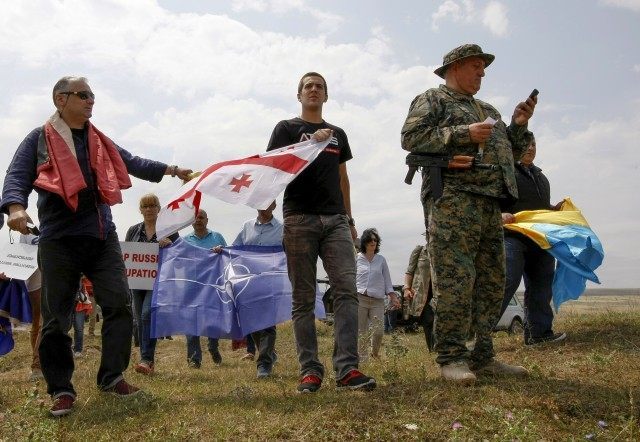The Russian government has unilaterally moved its nation’s border more than half a mile into Georgian territory through South Ossetia. Not surprisingly, a British Petroleum (BP) oil pipeline is in the region.
The Georgian Foreign Ministry claims Russian officials propped up banners into Georgian territory near villages of Tsitelubani and Orchosani. Moscow denies the accusations, but residents in the villages told reporters a different story.
“We’ve lost most of our fields,” explained a farmer who lives in the area. “The Russians said we are no longer allowed there.”
Russia took advantage of the Greece fiasco to take the lands in the disputed region. But the European Union lashed out at the move on Thursday.
“Steps that could be perceived as provocative must be avoided,” stated EU foreign policy chief Federica Mogherini. “The EU reaffirms its full support for Georgia’s territorial integrity within its internationally recognized borders.”
Out of all the international gas companies, BP has the largest presence in Russia with 20 percent invested in Russia’s Rosneft. The company said they will use this to try to ease tensions between Russia and the West.
“We will seek to pursue our business activities mindful that the mutual dependency between Russia as an energy supplier and Europe as an energy consumer has been an important source of security and engagement for both parties for many decades,” said Chief Executive Bob Dudley at the company’s annual shareholders meeting. “That has got to continue and I think we play an important role as a bridge.”
Russia provides BP with over a quarter of their “oil output worldwide and more than a third of its oil and reserves.” In May 2014, BP attended the St. Petersburg International Economic Forum with Igor Sechin, President and Executive Chairman of Rosneft, a man under American and EU sanctions. BP signed a contract “that agreed to $300 million of financing for a joint development of deposits near Kazakhstan.”
Vladimir Putin has made multiple public statements indicating a desire to reconstruct the USSR. While Russia’s invasion of Ukraine is recent news, it all started back in 2008 when the Kremlin entered a short war with Georgia and emerged with two breakaway regions, South Ossetia and Abkhazia.
The international community does not recognize these breakaway regions, but Putin still signed “effective annexation” treaties with both countries, both led by ex-KGB agents. The treaties allow Moscow to control their foreign policy, border, and security.

COMMENTS
Please let us know if you're having issues with commenting.